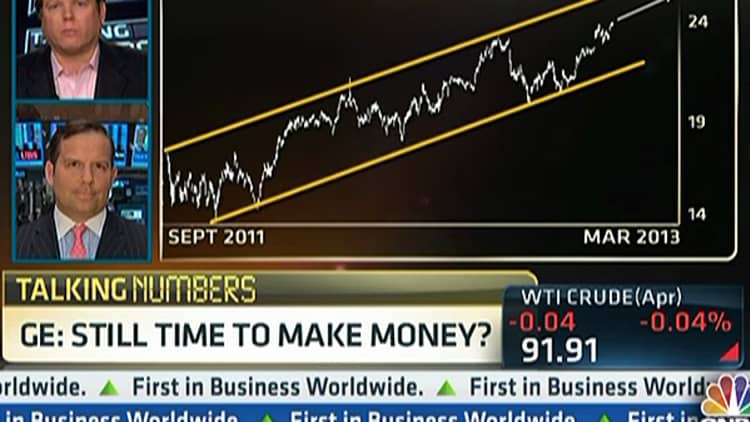General Electric has made tremendous progress over the past few years and the increase in the company's share price has led to a downgrade by Nomura Securities analyst Shannon O'Callaghan.
O'Callaghan on Monday lowered his rating on GE to "neutral" from a "buy," while keeping his price target for the shares at $24 and saying in a report that the stock's price-to-earnings ratio is now "in line with premier industrial peers despite GE still getting 40 percent to 45 percent of its earnings from GE Capital."
GE's stock closed at $23.62 Monday, returning 13 percent year-to-date, following a 21 percent return during 2011. The shares trade for 12.8 times the consensus 2014 earnings estimate of $1.85. The consensus 2013 earnings per share (EPS) estimate is $1.67.

GE in January reported 2012 operating earnings of $16.065 billion, increasing from $14.915 billion in 2011. Operating earnings per share — excluding the effects of preferred stock redemptions in 2011 —grew to $1.52 a share in 2012 from $1.38 the previous year.
GE Capital — the company's finance arm that was much maligned during the financial crisis — had earnings from continuing operations of $6.215 billion in 2012, declining slightly from $6.510 billion the previous year. With the finance unit continuing to free up capital in line with CEO Jeff Immelt's strategy to right-size the balance sheet, GE Capital paid dividends to the parent company totaling $6.4 billion last year.
With GE Capital returning to being a cash cow for the parent, GE repurchased $5.2 billion worth of common shares in 2012, and raised the quarterly dividend on common shares by $0.02 to the current payout of $0.19, for an attractive dividend yield of 3.20 percent.
In addition to the release of excess capital from GE Capital and the parent company's capital return to investors, O'Callaghan said GE's progress over the past year has included a "target for 65 percent industrial earnings mix by 2015 (ultimately 70 percent)."
"We applaud these positives," he wrote, "but we think they are now reflected in the valuation, adjusting for accounting differences."
GE's price multiple of over 14 times the 2013 consensus "may look like a discount to peers at 15.5x, [but] we estimate that the non-operating pension expense that is excluded from consensus and our estimates for GE has increased from $0.06 in 2011 to $0.16 in 2013," O'Callaghan wrote.
On a "comparison GAAP pension basis," O'Callaghan estimated that GE's stock trades for 15.7 times 2013 earnings, putting the stock at a "slight premium" to Emerson Electric, United Technologies, and 3M," according to O'Callaghan.
"Given the 40 percent to 45 percent of GE's earnings still coming from GE Capital, this implies GE's industrial earnings are already being awarded a premium P/E," according to the analyst.
The analyst's $24 price target for GE is based on a multiple of 14 times his 2014 EPS estimate of $1.70, adjusted for the GAAP pension expense.
GE Capital had $273.9 billion in total financing receivables as of Dec. 31. No one would argue that providing financing to industrial customers is a great way to make a lot more money, but consumer finance receivables made up 42 percent of the total. Many analysts view this as a continuing worry, in light of the company's need to have its commercial paper guaranteed through the Federal Deposit Insurance Corp.'s Temporary Liquidity Program, at the height of the financial crisis in 2008.
With the Securities and Exchange Commission failing to achieve regulatory reform of money market funds, the possibility for another freeze-up of the commercial paper market exists, in the event of another severe recession.
Still, GE Capital's liquidity has strengthened considerably. The finance unit's ratio of debt to equity was 4.85 to 1 at the end of 2012, compared to a ratio of 9.62 to 1, at the end of 2008.
During 2012, 46 percent of General Electric's earnings from continuing operations before income taxes were contributed by GE Capital. "To make the case for a premium industrial P/E on total company EPS (with comparable pension accounting), we think GE needs to accelerate the transition of GE Capital to a commercial finance business representing 30 percent to 35 percent of earnings," O'Callaghan wrote.
Strengthening the case for a sale of GE Capital's retail finance businesses, the analyst said "recent reserving in Retail Finance seems to prepare that business for life after GE."
"Retail Finance earnings have already seen a sharp recovery, and now we think it is time for that business to look to grow, which conflicts with GE's plan to shrink the [GE] Capital earnings mix," O'Callaghan wrote.
—By TheStreet.com's Philip van Doorn
Additional News: 'Major Political Storms' Holding Back US: GE's Immelt
Additional Views: Talking Numbers: Buy or Sell GE?
___________________________
Disclosures:
TheStreet does not permit any employees on its editorial staff to individually hold positions in individual stocks, though they are permitted to own stock in TheStreet.
___________________________

